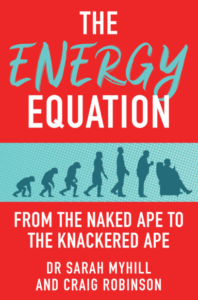As the long light of summer fades and the cooler, shorter days of autumn approach, it’s a pivotal moment to recalibrate our routines – to both sustain physical energy and cultivate mental wellbeing.
At Hammersmith Health Books, we often explore how seasonal changes affect our health and how we can support our bodies and minds through them. One of our titles, The Energy Equation by Dr Sarah Myhill and Craig Robinson, is especially helpful when it comes to understanding how to protect and optimise our energy levels – something we all need a bit more of as the sunlight fades and the pace of life starts to shift. Here are some key ways to stay healthy and positive through the seasonal transition:
- Fuel your energy engine
In The Energy Equation, Dr Myhill outlines how the body works like an engine, and like any engine, it needs the right fuel to function properly. As we head into autumn, this means being mindful of what we eat, aiming for nutrient-rich, warming foods that support our internal systems.
Now is a great time to embrace seasonal vegetables – see what is recommended in these authors’ related book, Paleo-Ketogenic: the why and the how [link]. Think hearty stews and homemade soups based on bone broth, and and slow-cooked meals that are easy on the digestion and packed with vitamins and minerals. Season them with Sunshine salt [link to entry on Sarah’s website] and add warming spices like ginger, turmeric and cinnamon which not only enhance flavour but also support circulation and help combat inflammation.
And let’s not forget hydration – just because it’s cooler doesn’t mean we need less water. Herbal teas, warm water with lemon or even broth-based drinks can help you stay hydrated and warm.
- Prioritise rest and recovery
Dr Myhill is clear on this: energy is not just about output – it is also about rest. Sleep is when our bodies do their most important repair work. But shorter daylight hours and increased screen time can interfere with our natural sleep rhythms.
As summer ends, consider adjusting your evening routine to align more closely with natural light. Try dimming the lights earlier, reducing screen use before bed, and incorporating calming habits like reading, gentle stretching or sipping chamomile tea. These small changes can make a big difference in your energy and mood the next day.
If your sleep still feels off, it might be worth reviewing your bedtime environment: is your room cool and dark enough? Is your sleep schedule consistent? These are small tweaks with powerful effects.
- Support your immune system
With colder weather comes increased exposure to viruses and more time spent indoors. In The Energy Equation, immune stress is seen as a major energy drain – so keeping your immune system strong is essential for staying energised.
Focus on foods high in Vitamin C (like citrus fruits, red peppers and broccoli, plus supplementation), get outside for some Vitamin D while there is still some strength in the sun (or supplement if needed), and continue to support gut health with fermented foods and/or probiotics. Balanced blood sugar from a PK diet and quality sleep both play a role in keeping you well, and take a look at these authors’ book The Infection Game [link] for advice on what to do if symptoms strike.
It’s also important to manage stress, as chronic stress weakens immune function. Mindful practices, laughter, connection with loved ones, and time to yourself can all help buffer stress through the darker months.
The seasonal shift from summer into autumn doesn’t have to mean a slump in energy or mood. With the right mindset and lifestyle adjustments – rooted in the practical insights from The Energy Equation and beyond – you can support both physical vitality and emotional balance through the months ahead.
So as the leaves begin to turn and the pace of life changes, consider this your seasonal check-in. Nourish your body with wholesome PK food, get outside as much as possible before the days get short, honour your need for rest, and make space for calm and joy in your daily life.
Buy Dr. Myhill’s Sunshine Salt here.






 The humble carrot is not only delicious, but also an excellent source of Vitamin A and K, as well as potassium. Carrots are also a good source of several B vitamins, and including carrots in the diet can improve your eye health, reduce your risk of cancer and also aid in weight loss.
The humble carrot is not only delicious, but also an excellent source of Vitamin A and K, as well as potassium. Carrots are also a good source of several B vitamins, and including carrots in the diet can improve your eye health, reduce your risk of cancer and also aid in weight loss.

